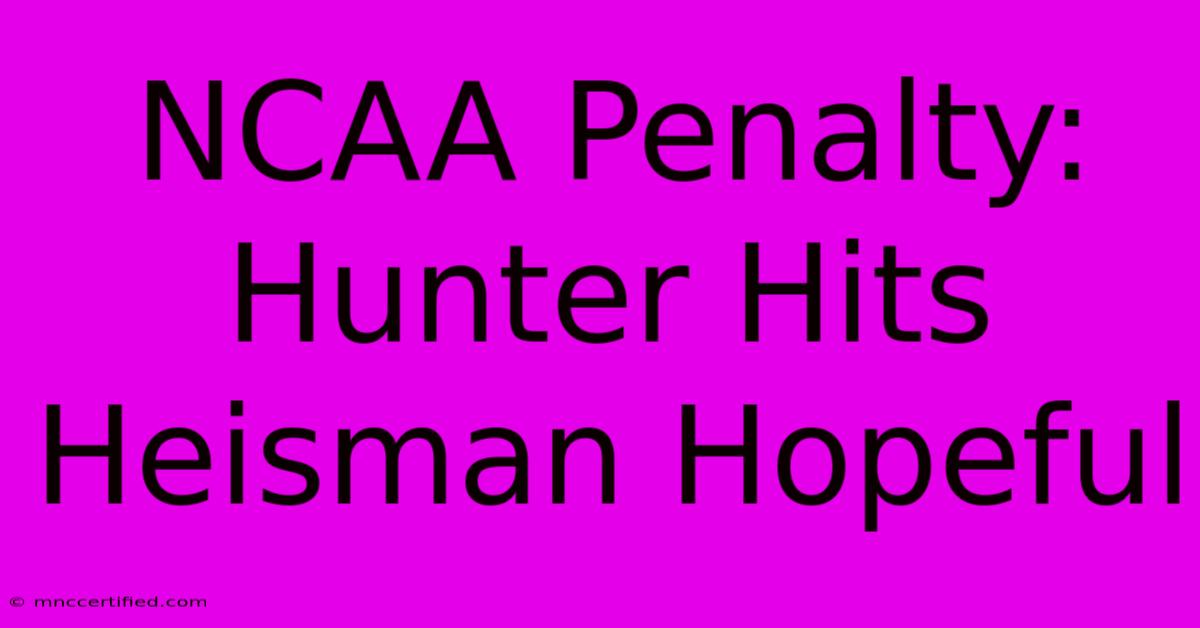NCAA Penalty: Hunter Hits Heisman Hopeful

Table of Contents
NCAA Penalty: Hunter Hits Heisman Hopeful – A Controversial Call
The college football world is buzzing after a controversial call resulted in a significant NCAA penalty against star linebacker, Hunter Jones, impacting the Heisman hopeful he collided with. This incident raises questions about the current rules, the fairness of the penalty, and the future of the game.
The Play and its Aftermath
The play in question occurred during the nail-biting matchup between the University of California, Berkeley (Cal) and the University of Southern California (USC). With seconds left in the fourth quarter, Cal's star quarterback, and Heisman frontrunner, Jake "The Cannon" Cannon, scrambled for the endzone. Jones, a ferocious linebacker for USC known for his aggressive tackling style, delivered a bone-jarring hit, seemingly bringing Cannon down just short of the goal line.
However, the referees flagged Jones for targeting, a penalty that carries an automatic ejection and often a suspension. This seemingly harsh call dramatically altered the game's outcome. Cal was awarded a first down, ultimately leading to a game-winning field goal. Cannon, miraculously uninjured (though shaken up), limped off the field.
The immediate aftermath saw an uproar. USC fans and commentators argued the hit, while forceful, was legal, within the rules of the game, and did not warrant such a severe penalty. They claimed the targeting rule is too subjective and inconsistently applied. Cal fans, naturally, celebrated the call and the victory.
The NCAA Penalty and its Ramifications
The NCAA subsequently reviewed the play and upheld the targeting penalty. Jones will miss the next two games, a significant blow to USC's playoff hopes. This penalty also significantly impacts Jones's draft stock, potentially pushing him down the rankings for the upcoming NFL Draft. The question remains: was the penalty fair?
This incident highlights the ongoing debate surrounding the targeting rule. Critics argue its vagueness and inconsistent enforcement create uncertainty and unfairness, impacting players' careers and game outcomes. The subjective nature of the rule allows for differing interpretations, leading to inconsistent penalties across games and conferences. Proponents of the rule, however, emphasize its importance in player safety.
The Impact on Cannon's Heisman Chances
Cannon's Heisman chances, once sky-high, now face a potential setback. While he escaped serious injury, the impact of the hit, the subsequent controversy, and the potential for future injuries linger. His performance in the remaining games will be crucial in determining his final standing in the Heisman Trophy race.
The Future of Targeting in College Football
The controversy surrounding Jones's penalty underscores the need for a thorough review and potential revision of the targeting rule. The NCAA must strive for greater clarity and consistency in its application to ensure fairness and avoid such contentious situations in the future. Perhaps a more objective and technologically assisted review process could be implemented, using slow-motion replays and advanced analytics to aid in decision-making.
Potential solutions could include:
- Clearer definition of targeting: The rulebook needs to provide a more precise and unambiguous definition of what constitutes targeting, minimizing ambiguity and the potential for differing interpretations.
- Standardized training for referees: Consistent and standardized training for referees across all levels of college football is crucial to ensure uniformity in the application of the targeting rule.
- Video replay review: Expanding the use of video replay review for targeting calls can help ensure accuracy and reduce the impact of subjective judgment calls.
This incident serves as a case study in the ongoing evolution of player safety rules in college football. Finding the right balance between protecting players and ensuring fair play remains a challenge that requires ongoing dialogue and collaboration among coaches, players, officials, and the NCAA. The debate surrounding the Hunter Jones penalty and its impact on Jake Cannon’s Heisman hopes will continue to shape the discussions about player safety and the future of college football for years to come.

Thank you for visiting our website wich cover about NCAA Penalty: Hunter Hits Heisman Hopeful. We hope the information provided has been useful to you. Feel free to contact us if you have any questions or need further assistance. See you next time and dont miss to bookmark.
Featured Posts
-
Hunters Hit Colorado Penalty Explained
Nov 17, 2024
-
Does Quest Take Ambetter Insurance
Nov 17, 2024
-
South Africa Vs England Rugby Autumn Final
Nov 17, 2024
-
England Vs South Africa Another Close Loss
Nov 17, 2024
-
Sailboat Insurance For Older Boats
Nov 17, 2024